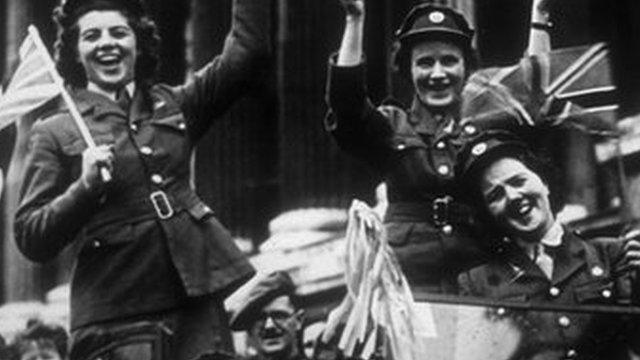VE Day memories recalled 70 years on
- Published
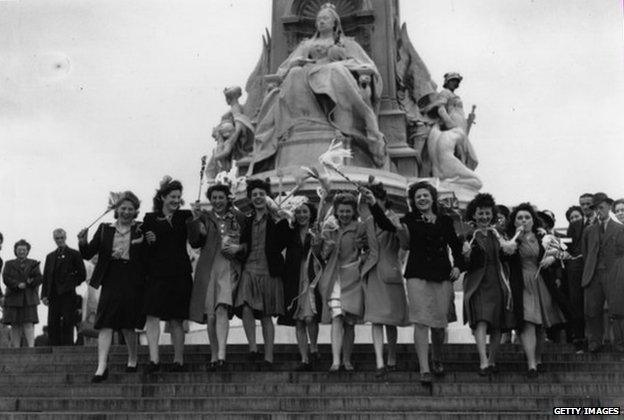
Crowds gathered outside Buckingham Palace when 8 May was declared a public holiday
Celebrations erupted across the UK upon the defeat of Germany and the end of World War Two in Europe.
A public holiday called Victory in Europe Day - or simply VE Day - was declared on 8 May 1945.
However, the day brought mixed emotions for many.
Seventy years on, six people recall what the end of the war meant to them.

Hitler's ex-bodyguard and his English wife
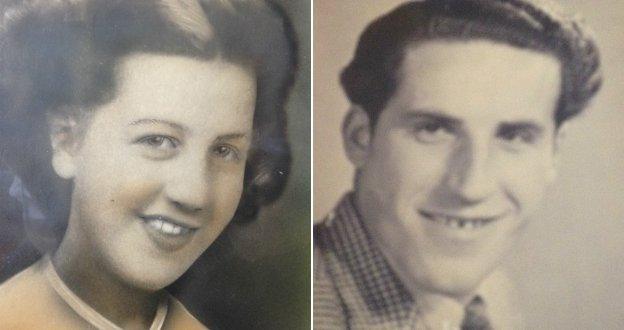
Betty Dickinson and Hans Kuhn met at a fete in Leicestershire after the war ended
Hans Kuhn was a 20-year-old German prisoner of war in Tennessee, USA, when the war ended.
"On VE Day there wasn't any celebration going on there because we were the losing ones," he told BBC Radio Leicester.
"But I went across to the canteen on the site, had a few drinks with some friends. Shortly after that they started to get ready to send us back to Germany."
Across the Atlantic, 14-year-old Betty Dickinson was living in Melton Mowbray, Leicestershire.
"On VE Day I was still at school," she said. "Everybody was so happy."
But her family had suffered losses, as had many others.
"My mother had lost two of her brothers in the war so she was anti-German," she said. "She hated the Germans."
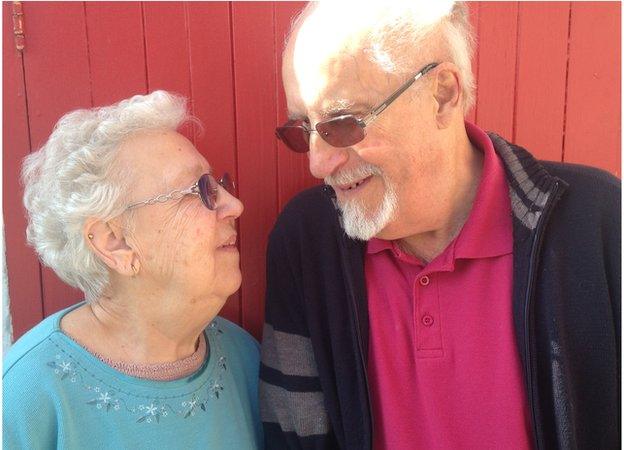
Betty and Hans Kuhn have been married for 66 years
Mr Kuhn had been one of Hitler's bodyguards before being sent to Normandy, where he was badly wounded and saved by the US.
After the war he went to work on a farm in Leicestershire, where he met Betty at a fete.
"I couldn't stand him," laughs Betty. "He just grew on me, and of course I got pregnant, didn't I? I was 18 when we got married."
Mrs Kuhn had to endure being spat on, called a "Nazi lover" and even being punched and kicked by a gang of youths.
"We got over it, we are still together, so we are having the last laugh, aren't we?" she said.
Mr Kuhn said he would never have imagined, back then on VE Day, that he would be married to an English girl 70 years later.

"Brown babies" fathered by a GI
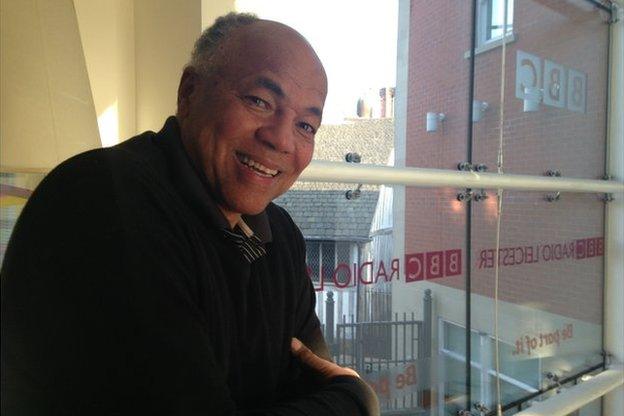
Terry Harrison said he and his twin sister were accepted by their five white siblings
Terry Harrison and his sister Susan were born 11 months before VE Day, on 9 June 1944, after his mother had an affair with a black American GI.
Most "brown babies" fathered by black GIs were given up for adoption or sent to children's homes, but Mr Harrison's mother refused to give her children away.
Her husband Charlie Harrison was away fighting, and when VE Day came she still had not told him about the twins.
"Most wives were looking forward to seeing their husbands come home from the war, but in my case mum was a bit apprehensive," he told BBC Radio Leicester.
"There's no doubt the first time he knew was when he returned from the war, and when he walked in the house."
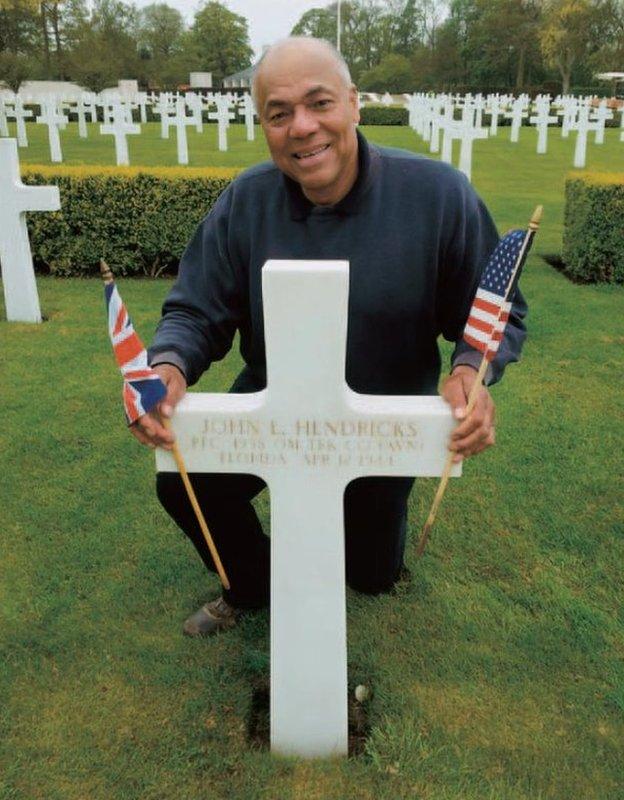
Terry Harrison visited his father's grave for the first time when he was 65
Mr Harrison's mother was treated cruelly by neighbours in the Leicestershire village of Gaddesby, and by members of her own family.
"In my early years I can remember going down the street and people walking across the street away from my mum, and sometimes dustbin lids being clattered across the street in disgust," he said.
"And mum had to endure this and the pain that she suffered, even from her sisters, my aunties and relations at that time."
His real father, John Lawrence Hendricks, was killed by his own side in a "friendly fire" incident in Wales two months before the twins were born.
Mr Lawrence's family told him his father was killed fighting the Germans, and he only recently discovered the truth.
He has since visited his father's grave at a US cemetery in Cambridge, and said it was "the most wonderful thing in my life".
"I may not have known my real father but I did know my mother and she to me is my inspiration for what I do in my life, because she had the determination and the courage," he said.

A Wren serving in London
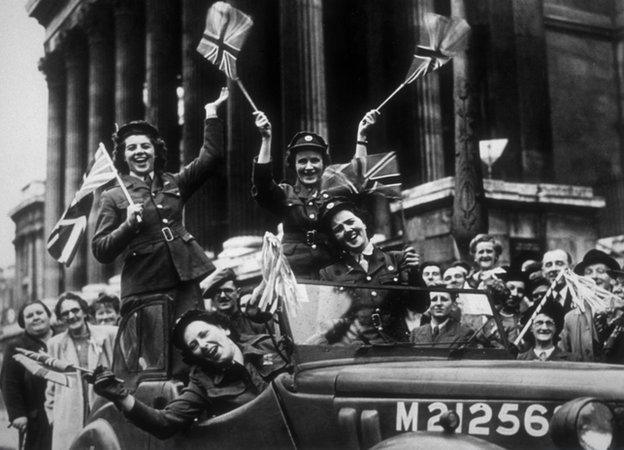
Wrens were among those celebrating in Trafalgar Square
Val Royston worked for the Women's Royal Naval Service in London and she and her fellow Wrens went to join the crowds outside Buckingham Palace on VE Day.
She remembers a "brilliant atmosphere" as people waited to see prime minister Winston Churchill and the Royal Family on the balcony.
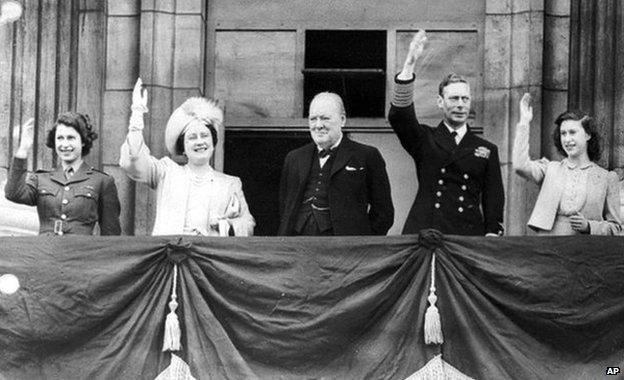
Val Royston remembers seeing Princess Elizabeth - the future Queen Elizabeth II - waving from the balcony
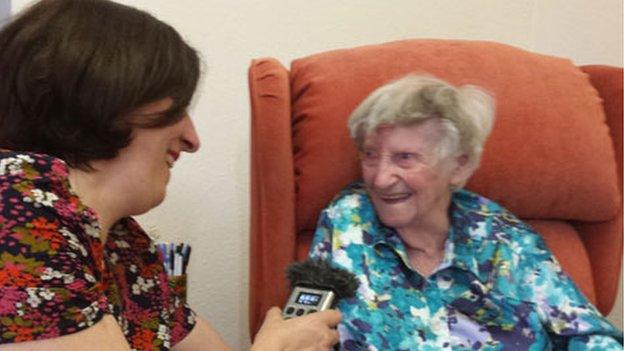
Val Royston, now 97, was 27 at the end of the war
"They kept announcing that the family will come out again at such and such a time, so of course you stay on a bit longer, don't you," she told BBC Radio Sheffield.
"It quietened down, obviously, when they went back in again, and then when they came back out again, it was just as you expected," she said.
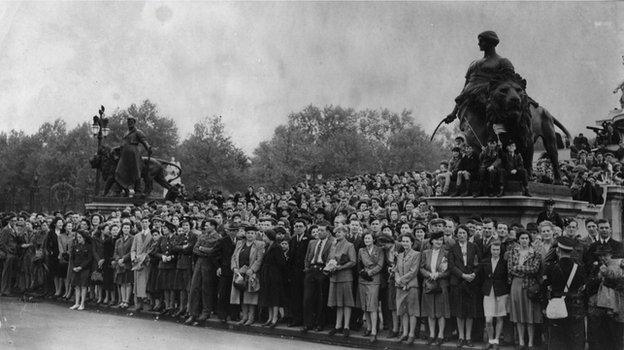
Val Royston wrote a letter to her parents describing the atmosphere outside Buckingham Palace
The crowds were "roaring their heads off" and The Mall was full with "a heck of a lot of people".
Some of her friends went on partying into the night in Piccadilly, but she went home to write a long letter to her parents back in Sheffield, telling them about the day's events.

A grieving wife and daughter
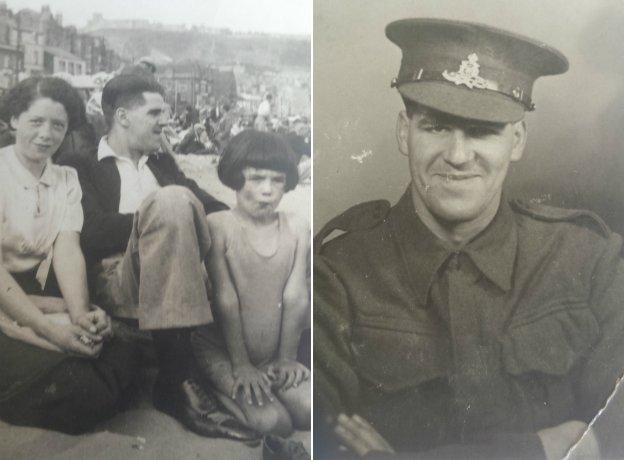
Betty Allen, shown here with her parents in Scarborough, opened the telegram saying her father was dead
While millions of people were celebrating, Betty Allen was grieving the death of her beloved father.
Just the day before VE Day - and a few days before her 13th birthday - she and her mother received a telegram saying he had been killed.
"I've always felt nothing to celebrate," she told BBC Radio Sheffield.
"I mean I should feel different but even now I still feel that I can't celebrate when my mother and I were in such misery.
"It didn't seem fair that he had gone through the war and right at the very end he had to lose his life."
Betty was an only child and "worshipped" her father, George Henry Terry.
Despite being only 12, she opened the telegram herself as she wanted to protect her mother, who was at work when it arrived at their home in Doncaster, South Yorkshire.
"We were thinking he would be coming home soon," she said. "It felt dreadful. I really didn't know what to do."
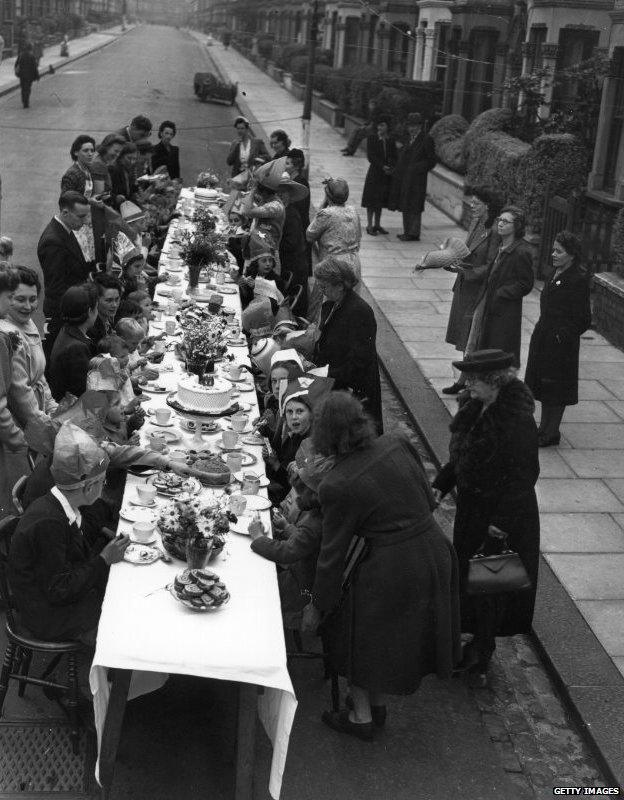
Betty Allen was not able to celebrate the end of the war, as many people did with street parties
Her father been shot by a sniper's rifle in Germany.
After his death, Betty used to follow soldiers around pretending that they were her father.
"If I saw a soldier I would just walk behind him a little thinking, 'Oh that might be my dad', and of course I know it wasn't."
She has talked to her father, in her mind, throughout her life.
"Even this last year I remember saying, 'I'm old now dad', as if I've kept him up to date with life," she said.
Even now, she still cries when reading a letter sent to her mother by one of her father's friends.
It reads: "He always thought of his wife and family and was hoping for the day to get back to them."

A soldier serving in Italy
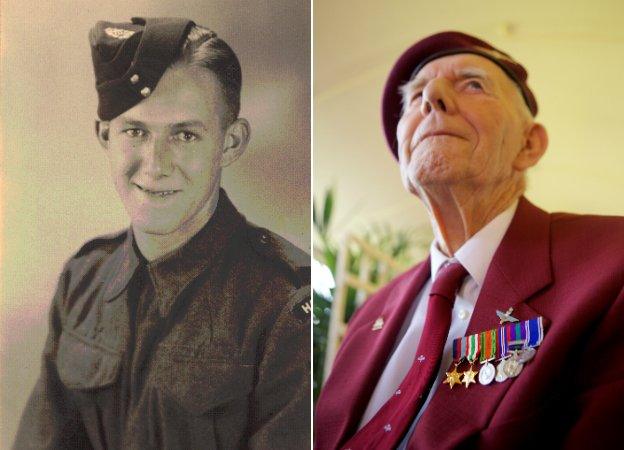
Donald "Dixie" Dean, born in 1924, volunteered for the Hampshire Regiment on his 18th birthday
Donald "Dixie" Dean remembers days of relaxing, drinking alcohol and even climbing into a fountain after fighting ended in Italy on 2 May - six days before VE Day.
He had just completed parachute training 10 miles from Rome.
"We were going into Rome every evening because the war was over as far as we were concerned," he told BBC Surrey.
He said the end of the war "was just a feeling of relief, mainly".
"I remember one evening, it might have been 5 May, we decided we were going to live for a while, so we went into a bar and we had all the drinks, different coloured liquids.
"We went from one to the other, to the other, to the other, to the other, yellow and green, God knows what they were. It's a wonder we didn't fall down dead," he laughs.
"I remember getting up to my knees in this fountain and there was a couple of sailors in there as well, and one kept shouting out he was drowning."
- Published8 May 2015
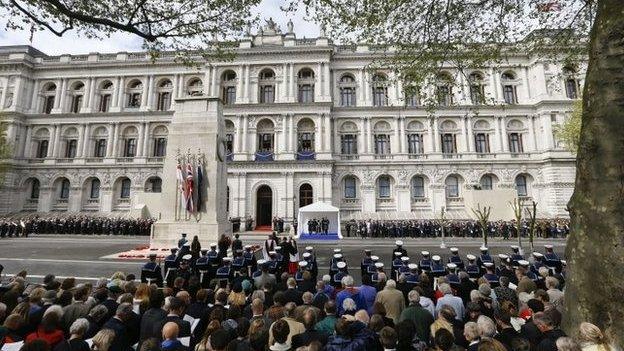
- Published7 May 2015
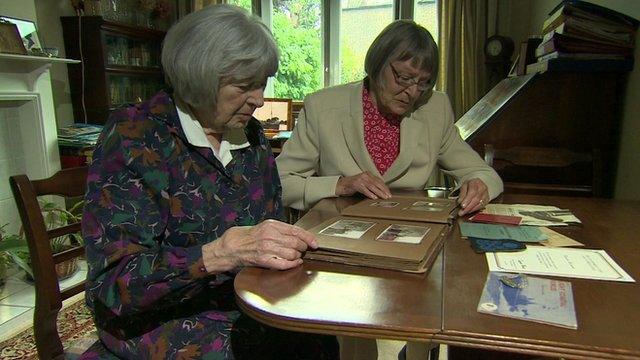
- Published6 May 2015
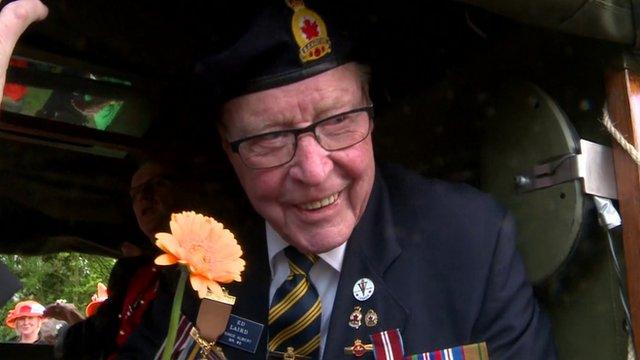
- Published6 May 2015
